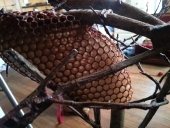I've used langs, warres, top bars and I have other interesting hybrid hives, bee trees and even a colony living in the wall of my house (they did that on their own). By that I mean I've had my hands in a lot of different kinds and my attitude has shifted over the years.
If you want to be hands-on and see more of your bees, I find the top bar hive to be the easiest on the colony. You can open the hive to do something and only the bees one bar up and back from where you are will be aware of your presence. (Honestly, they will all know but they won't tend to be upset.)
What I like about top bars -- Easy to learn on, and you get a full experience of working with your bees. Easy to maintain IF you keep them correctly from the beginning. Mostly that means making sure they are building their first combs straight (on the bars) and not curved. Once you get past that hurdle, it's pretty simple. When you harvest, which you can do through the season, you can take one or two frames at a time. For learning this method, I highly recommend Corwin Bell's DVD "Alternative Beekeeping Using the Top Bar Hive and The Bee Guardian Methods."
http://www.backyardhive.com ($20)
Nope, I don't get a nickel for sending you his way, I just plain think it's the best movie on respectful and practical beekeeping I've seen. Even if you aren't a top bar keeper, you'll learn a lot from watching it and ought to have it in your library. That website has some lovely inexpensive plans for building a "Golden Mean" hive if you are carpentry-inclined.
If you want a real hands-off approach, read Abbe Warre's book about the Warre hive, get or build one, and then join David Heaf's yahoo discussion list for support. You only go in there 2-3 times a year to check on them. When you harvest honey, you take the entire top box. My personal method with a first year hive: I don't harvest till the second year. Warre's are a more hands-off approach but you still have to spend time observing. If you do need to intervene, they are harder to do that with.
https://uk.groups.yahoo.com/neo/groups/warrebeekeeping/info
Langs I'd say are my furthest choice. The advantage is the the equipment is often interchangeable with other beekeepers, so if you are going to do trading and a friend is going to supply you with brood frames or honeycomb frames, that's worth considering. These langs make it easy to get advice from conventional beekeepers (if that doesn't push buttons for you).
Most folks are on their own, though, and frankly, you'll do better by choosing what kind of beekeeper you want to be and choosing the hive box based on that. With Langs you'll learn methods that you may choose not to do later as you learn more about bees but you can find lots of conventional help. My guess is that if you're a permie-type, you'll probably end up going with top bars or warres or something like that. Top bars -- hands on and easiest to interact with. Warre's -- hands-off and least involvement.
There are more alternatives, too, but those are the main ones.
Jacqueline

 2
2









 3
3













 1
1
















 1
1








 2
2
















